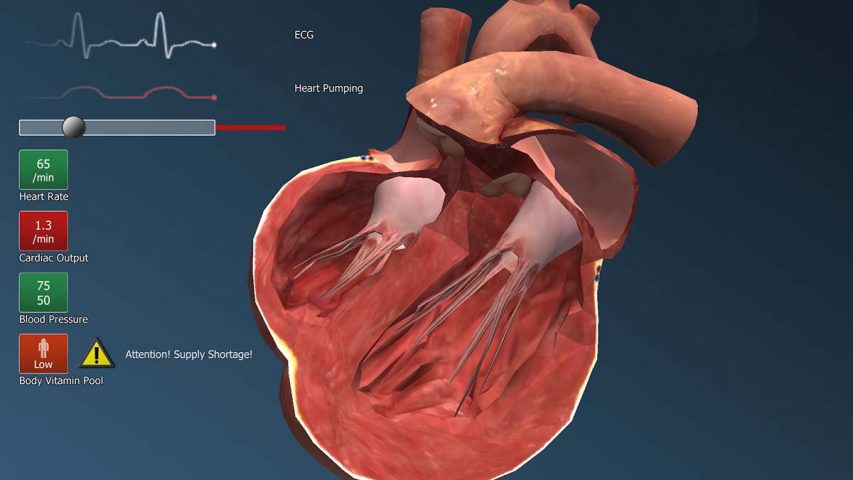- Have any questions? Contact us!
- info@dr-rath-foundation.org

Polypharmacy and cancer patients – the dangers of long-term multiple drug use
April 26, 2018
Vitamin D deficiency linked to greater risk of diabetes
May 1, 2018Scientific Research Confirms Micronutrients Prevent Heart Failure

Unknown to many doctors, scientific research has clearly confirmed that higher levels of vitamin C reduce the risk of heart failure. A study published in the American Heart Journal in 2011 examined the association between blood vitamin C concentrations and heart failure in 9,187 men and 11,112 women aged between 39 and 79 years old. The researchers found that the risk of heart failure occurring was reduced when higher levels of vitamin C were present. Conversely, people with the lowest levels of vitamin C had the highest risk of developing the condition.
The results of this study support the findings of Dr. Rath’s groundbreaking Cellular Medicine research, which show that the primary cause of heart failure is a chronic lack of micronutrients in the energy producing cells of the heart muscle. Micronutrient deficiency weakens the pumping function of the heart and leads to an impaired circulation of the blood. As a consequence, the kidneys become unable to perform their vital function of removing excess water from the body by filtering it from the blood into the urine. This results in water being retained in tissues, therefore causing swelling of the legs, ankles, and other parts of the body. Such swelling is known as edema. Other common symptoms of heart failure include shortness of breath, dizziness, tiredness, and a persistent cough due to fluid buildup in the lungs.
Clinical risk factors for heart failure
 One of the key clinical risk factors for heart failure is a heart attack. Patients suffering heart attacks experience significant damage to their heart muscle cells. This leaves the heart in a weak state, thus making it prone to further cardiovascular problems developing. Coronary artery disease, which itself is a major cause of heart attacks, is thus a key risk factor for heart failure.
One of the key clinical risk factors for heart failure is a heart attack. Patients suffering heart attacks experience significant damage to their heart muscle cells. This leaves the heart in a weak state, thus making it prone to further cardiovascular problems developing. Coronary artery disease, which itself is a major cause of heart attacks, is thus a key risk factor for heart failure.
High blood pressure, known as hypertension, is another important risk factor for heart failure as it too damages the cells of the heart. As the heart has to work harder to pump the blood when the blood pressure is high, over the long term this can result in a significant reduction of its pumping power.
Irregular heartbeat, known as arrhythmia, is also a risk factor for heart failure. This is especially the case if the abnormal rhythms are frequent and fast, as the heart muscle can consequently become weakened.
Anemia, a condition in which there is a deficiency of red blood cells or hemoglobin in the blood, is frequently found in cases of heart failure. Anemia weakens the heart by requiring it to pump harder in an attempt to deliver sufficient oxygen to the various organs of the body.
Diabetes is also a risk factor for heart failure, as it increases the risk of high blood pressure and coronary artery disease developing.
For each of these clinical risk factors, however, the primary cause is the same: a chronic deficiency of essential micronutrients. This means that an optimum daily intake of the correct micronutrients is the basic measure both for preventing and correcting heart failure.
The Cellular Medicine approach to heart failure
Conventional drug treatments for heart failure have significant side effects. Treatment with diuretics to remove excess fluid is particularly dangerous as it significantly lowers levels of vitamin C and other essential nutrients in the blood. Similarly, cholesterol-lowering statin drugs are well known to damage the kidneys and liver. Fortunately, however, scientific research and clinical studies have clearly documented the benefits of specific micronutrients in improving the pumping function of the heart.
In addition to optimum amounts of vitamin C, the use of nutrients such as vitamin E, vitamin B1 and other B vitamins, coenzyme Q10, carnitine and taurine can safely prevent and correct heart failure by optimizing levels of cellular energy in the heart muscle cells. As documented in chapter 5 of Dr. Rath’s lifesaving book, Why Animals Don’t Get Heart Attacks…But People Do!, use of these micronutrients in the correct dosages can essentially render heart transplants redundant.
The fundamental message is therefore very clear: optimizing your micronutrient intake optimizes the functioning of your heart and prevents heart failure. If you have any questions about the use of Dr. Rath’s Cellular Medicine approach for preventing and combatting this life-threatening condition, please feel free to contact us.




